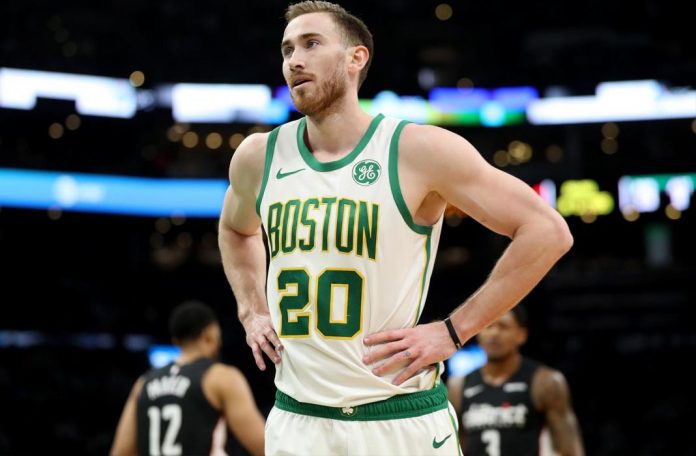The way the 2018-19 NBA season ended for the Boston Celtics was probably worse than the worst-case scenario in any Celtics fans’ heads. With more questions than answers heading into the offseason, some crucial decisions will have to be made this summer. Will Kyrie Irving decide to re-sign with Boston? Does Boston even want him back? How much money is Al Horford worth? Can Jayson Tatum and Jaylen Brown really develop into the players we thought they could be last postseason, behind the leadership of Irving?
One of the most glaring problems on this team was the abundance of shot creators. Some, like Irving and Tatum, need the ball in their hands to do their best work. Others, like Brown, need that time with the ball to fully develop his creating skills. Then, there are players like Marcus Morris or Terry Rozier, who’d fit well on a different team but perhaps not with the Celtics. Boston’s goal this summer should be to find a way to cut loose some of these players and get as much value in return as possible.
There have been a lot of different solutions offered by different people. But there’s one move that would be a mistake – making a Gordon Hayward trade.
There’s some valid reasoning to cutting ties with Hayward. He soaks up cap space with his massive contract and just isn’t worth the money. Hayward also takes up minutes Brown or Tatum could be using to develop as part of Boston’s logjam at the wing.
And of course, we all know he was bad this season. There’s no need to go into detail about that. In his current state, he’s definitely not a player worth $30 million. But, I’m not saying he’s untouchable because of his basketball value. It’s about the precedent the Celtics need to set and Hayward’s current trade value.
Remember back when Anthony Davis first declared his trade request? He did NOT have Boston high on his list. To quote Davis’ own father “Boston … I would never want my son to play for Boston after what they done to Isaiah Thomas … NO LOYALTY… guy gives his heart and soul and they traded him … anyone can print that.”
If Boston traded for Davis, he’d be a free agent in 2020. For a team that’s been circling the situation like sharks around a kill, that’s not a good sign.
How do you think Davis Sr. would feel if the Celtics turned around and dumped Gordon Hayward, not even two years after suffering a career-altering injury for them? How do you think other NBA free agents would feel knowing that Boston will flip anyone on a moment’s notice? There was already an outcry after Isaiah Thomas was dealt. Imagine the consequences if Boston traded Hayward too. It’d be the logical thing to do in 2K, but not in real life where players have real emotions.
Secondly, GM Danny Ainge would literally need to pay other teams extra to accept Hayward’s contract in a trade. This isn’t necessarily because Hayward is just that bad of a player, it’s that other GM’s know they have all the leverage in the negotiation. And, if you’re thinking about including Hayward in the Anthony Davis trade to match salaries, it might be even worse. Instead of getting away with maybe including only Jayson Tatum as the centerpiece, now Boston’s probably losing Jaylen Brown as well. That’s quite the decimation of Boston’s wing depth.
Additionally, chances are, Hayward’s going to be a lot better next season. Recall that although Hayward had a year to recover, most of it wasn’t spent playing basketball. He wasn’t fully cleared to play basketball until August, spending the offseason rehabbing after surgery. This is a period when most other NBA players are honing their skills and one that Hayward spent just trying to run again.
When Paul George went through a similarly painful ordeal back in 2014 after suffering a broken leg in Team USA practice, he came back to play the last six games of the regular season. Unsurprisingly, he looked nothing like his old self, but at least had the offense all to himself to try and regain his rhythm. George then spent the summer scraping off the rust and was back better than ever the next season. It’s reasonable that Hayward could have a similar comeback next season, with a whole offseason to work out.
So, to put it all together, a Gordon Hayward trade would be a mistake. It would be a terrible hit to Boston’s reputation as a franchise, which is bad for team morale and attracting free agents. It would mean moving a player at his lowest trade value, which is never the ideal thing to do. And lastly, Hayward could still end up being a positive on the court for the Celtics.
Hayward didn’t stop being good at basketball. He’s just not entirely confident in his body and a bit paranoid after such a traumatic injury. Nothing has ever been handed to Hayward, and it’s hard to see a man like him not try his absolute best to become better. With today’s technology and medicine, anything can happen.
There’s nothing wrong with exploring options to make a team better. And, of course, if Boston gets a good deal for Hayward, they should pull the trigger. It’s more likely, however, that Boston will get lowballed. When you think about the repercussions, there are much better paths to take. Don’t make another Gordon Hayward trade.
Instagram: @j_persources
Twitter: @j_persources

